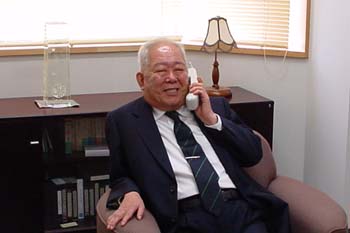They haven't invented anything that I know of except a controversial theory of quality control which some people would say is in the same category as this article. They pay attention, that's all.
Actually, Japan has a distinguished history of invention. In fact, apparently the person with the most patents at the United States Patent Office is no longer Thomas Edison, but is Shunpei Yamazaki with 1,432.
Perhaps the most currently famous is Sumio Iijima (recipient of the 2002 Benjamin Franklin Medal of Physics), the inventor of the carbon nanotube:

though the inventor of the blue and white LEDs, Shuji Nakamura (now at UCSB), is also quite well-known currently:

The Yagi antenna was invented by Hidetsugu Yagi.
Japanese engineers have made innovations for a long time in the textile industry. The most famous is probably Sakichi Toyoda, both a great inventor and a great businessman (number 13 on Forbes list of great businessmen)

-- he was a co-founder of Toyota. Japan's had a lot of influence in the textile industry; here's a decent summary from Yoshida, though I wish it had more about Japan's role in the development of air-jet and water-jet looms.
There are plenty of others, particularly in materials and chemical sciences, such as Kotaro Honda, inventor of NKS steel:

I am not sure that it counts as "invention" per se, but the Japanese have had many famous mathematicians, physicists, and chemists. The 2002 Nobel Prize for Physics was shared by the University of Tokyo's Masatoshi Koshiba:

Dr. Shin-Ichiro Tomonaga (also of the University of Tokyo), and Hideki Yukawa (University of Kyoto) also have received the Nobel Prize in Physics. Dr. Tomonaga shared his with Richard Feynman in 1965; Dr. Yukawa received the 1949 prize (not shared with anyone.)
In chemistry, Koichi Tanaka shared in the 2002 Nobel Prize:

In 2001, Ryoji Noyori was a co-recipient:

In 2000, Hideki Shirakawa was a co-recipient of the Chemistry Prize:

Kenichi Fukui shared the Nobel Prize in Chemistry in 1981.
In mathematics, there was the great Takakazu Seki (also known as Seki Kowa); Kunihiko Kodaira (recipient of the 1954 Fields Medal and 1984/1985 Wolf Foundation Prize in Mathematics); Heisuke Hironaka (recipient of the 1970 Fields Medal); Shigefumi Mori (recipient of the 1990 Fields Medal); Goro Shimura (of Taniyama-Shimura Conjecture fame and recipient of the 1996 Steele Prize for Lifetime Achievement); Kiyoshi Ito (winner of the 1987 Wolf Foundation Prize in Mathematics); and Mikio Sato (winner of the 2002 Wolf Foundation Prize in Mathematics.)
 a high-protein feed for feed for farm animals, insulation for low-income housing, and a top-notch engine coolant - made from 100 per cent recycled animals
a high-protein feed for feed for farm animals, insulation for low-income housing, and a top-notch engine coolant - made from 100 per cent recycled animals
